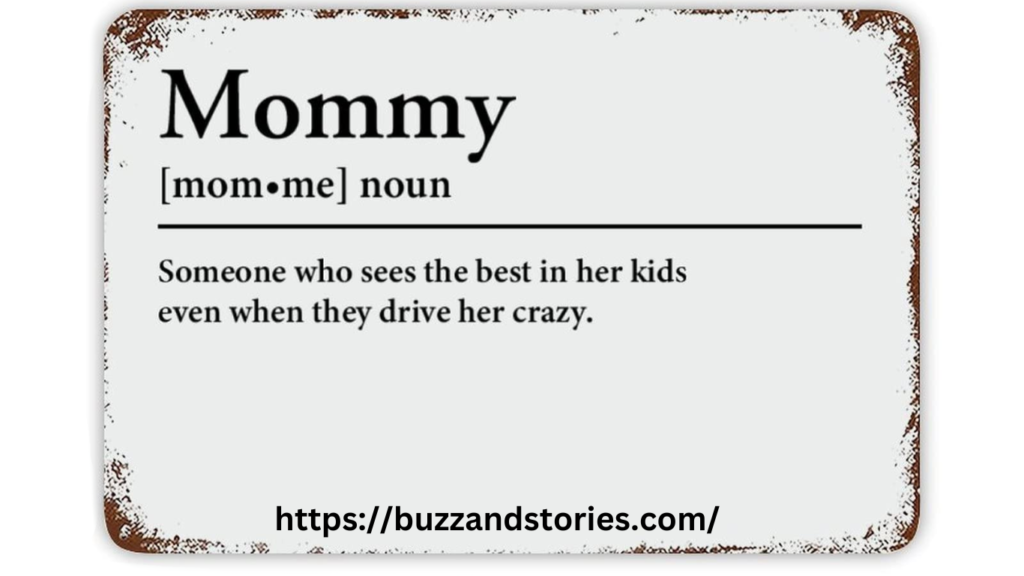Learning
How to Respond When a Guy Calls You “Mommy”
Published
4 months agoon
By
Dan Harry
Have you ever been called “mommy” by a guy and found yourself caught between amusement, confusion, and maybe a hint of awkwardness? You’re not alone. In recent years, this quirky nickname has made its way into casual dating and relationships, leaving many wondering what it really means and how best to respond. Is it simply playful, or does it hint at something deeper, perhaps even touching on what some call “mommy issues”?
When you’re navigating modern relationships, clear communication and understanding your own comfort level are essential. Whether you’re curious, mildly entertained, or just a bit uncomfortable with the term, responding confidently can help you take control of the moment. And while some might view “mommy” as a pet name with affectionate intent, others may consider it awkward or even a “bad word” in certain social contexts. Knowing how to handle these moments gracefully not only strengthens your boundaries but can also add a layer of lightheartedness and confidence to your interactions.
So, how do you respond when a guy calls you “mommy”? Let’s explore the different layers behind this term, from why he might use it to how you can confidently set the tone that works for you.
1. Understanding the Meaning Behind “Mommy”

When a guy calls you “mommy,” it can spark a range of reactions curiosity, confusion, maybe even a laugh. But what does it really mean? Is this just a quirky term of endearment, or does it carry deeper connotations? Let’s break it down and dive into the possible meanings behind this modern nickname.
Why Some Guys Use the Term “Mommy”
In some cases, calling someone “mommy” is simply a playful way to show affection. It’s an extension of pet names like “baby” or “sweetheart,” but with a twist that catches attention. The term has also gained traction through social media and pop culture, where it’s sometimes used to convey a mix of admiration, comfort, or dependency. So, if a guy calls you “mommy,” he might be leaning into this trend without thinking much about its deeper implications.
The Context Matters: Casual vs. Romantic
To understand what he truly means, consider the context. Here are a few things to think about:
- Is he saying it casually, as a joke, or playfully? In these cases, it’s likely that he’s just having fun with language, not aiming for a serious implication.
- Does he use the term often, or was it a one-time thing? If he uses it regularly, it could suggest a growing comfort level or familiarity, but that doesn’t mean it’s romantic.
- What’s the nature of your relationship? In a casual setting, it may be light-hearted. But in a more serious relationship, it can reflect a unique bond or, in some cases, a signal that he’s seeking emotional closeness.
When you gauge the context, you’ll have a clearer understanding of his intentions, allowing you to respond in a way that aligns with your comfort level.
Common Interpretations and What They Could Mean
Each person has their own interpretation of what calling someone “mommy” signifies. Some of the common meanings include:
- Playful Affection: He may see it as an endearing term, similar to “babe” or “honey,” just with a unique spin.
- Emotional Comfort: Sometimes, people use familial terms like “mommy” as a way of expressing emotional dependence or security. In this case, the term may indicate a comfort level that he associates with nurturing qualities.
- “Mommy Issues” or Psychological Influence: Occasionally, the term can hint at deeper emotional needs or associations, which are sometimes jokingly referred to as “mommy issues.” While this isn’t always the case, it’s worth considering if you sense there’s a more profound emotional layer behind the nickname.
Asking yourself these questions can clarify how you feel about the term and prepare you to respond in a way that aligns with your boundaries. While some might consider “mommy” a “bad word” or at least an uncomfortable one in relationships, others may find it a cute, harmless nickname. Either way, understanding his intentions and your reaction can make these interactions smoother and more enjoyable.
Sundance Film Festival 2025: Awards, Dates, Venue & Must-Know Insights!
2. Gauging Your Own Reaction and Comfort Level

When someone calls you “mommy,” your immediate reaction is important. How does it make you feel flattered, amused, or maybe a bit uncomfortable? Tuning into your response is the first step in deciding how to handle the situation with confidence. Let’s break down how to understand your reaction and why it’s essential for setting healthy boundaries.
Pause and Reflect: How Does It Make You Feel?
Before reacting, take a moment to recognize your feelings. Here are a few ways to analyze your reaction:
- Amusement: If it made you laugh, you may find the term playful and harmless.
- Discomfort: Feeling uneasy? This might indicate that you’re not comfortable with this nickname.
- Curiosity: Perhaps you’re intrigued by why he chose this term, and you want to know more.
By recognizing your own feelings, you’re setting yourself up to respond authentically, whether that means embracing the nickname or letting him know it’s not for you.
Clarify Personal Boundaries and Preferences
It’s okay if you’re unsure about the nickname or if you’d rather avoid it altogether. Establishing your comfort level with terms like “mommy” can help both of you navigate the relationship more smoothly. Here’s how:
- Assess the Situation: Think about how it affects you and whether it aligns with your personal boundaries.
- Be Honest with Yourself: Are you okay with playful language, or do you prefer something more traditional?
- Consider Setting Limits: If the term feels out of place, being clear with yourself will make it easier to communicate your boundaries later.
Setting boundaries early on lets you express yourself openly and helps avoid any misunderstandings.
Communicating Your Feelings in a Lighthearted Way
Sometimes, you might not mind the nickname but still feel the need to address it lightly. Here’s how to keep things playful while expressing your preference:
- Use Humor: Responding with a laugh or a witty remark can make the situation fun without getting overly serious.
- Redirect: Suggest an alternative nickname if “mommy” feels too awkward for you.
- Ask Playfully: You could say, “Mommy, really? Why that one?” This approach shows curiosity and keeps the conversation engaging.
Approaching it lightheartedly lets you express your comfort level without tension, creating an open dialogue that’s easy to navigate.
3. Deciding How to Respond

Now that you understand your feelings, it’s time to decide on a response that aligns with your comfort level. Whether you’re leaning toward playful banter or a clear boundary, here are some options to consider based on what feels right for you.
Playful Responses: Keeping the Mood Light
If you don’t mind a bit of teasing, try a lighthearted response. Here are some fun ways to reply:
- “Oh, so I’m ‘mommy’ now? We’ll see about that!”
- “Just for the record, I prefer ‘queen’ let’s upgrade that nickname!”
- “Is this a one-time thing, or do I need to start calling you ‘daddy’ too?”
These responses keep things fun and light without giving the term too much weight, letting you maintain control of the conversation.
Direct Responses: Setting Boundaries Respectfully
If the nickname doesn’t sit well with you, that’s completely valid. A direct approach can clarify your feelings without coming off as harsh:
- “Actually, I’m not super comfortable with that nickname. Could we go with something else?”
- “I know you meant it in a fun way, but I’d prefer if we stuck to other nicknames.”
- “Thanks, but ‘mommy’ just isn’t my style. Let’s find a nickname we both like.”
Direct responses show confidence and self-respect, helping you establish clear boundaries in a kind and respectful way.
Curious Responses: Encouraging Him to Explain
Sometimes, you may want to understand his reasoning without assuming his intentions. Curiosity can be a great tool for fostering openness:
- “I’m curious what made you choose ‘mommy’ as a nickname?”
- “Interesting choice! Is there a story behind that?”
- “Hmm, I wonder what made you think of that one?”
This approach lets you explore his thought process, potentially deepening your connection or revealing insights into his sense of humor.
4. Navigating Different Scenarios

The term “mommy” can carry different meanings depending on the nature of your relationship and the context in which it’s used. Let’s look at some common scenarios and how to respond based on the situation.
When It’s a Casual Relationship or Flirtation
If this is a more casual setting, keeping things light and fun is often the best route. Consider these points:
- Keep It Playful: There’s less need to overthink the meaning; just have fun with it.
- Stay Open-Minded: In casual relationships, people often test playful nicknames, so you can brush it off or join in if it feels right.
- Set the Tone: If you’re unsure, use humor to set a comfortable boundary without sounding overly serious.
In a Committed Relationship: Exploring Deeper Meanings
In a committed relationship, the term could suggest a unique dynamic or level of comfort. Here’s how to navigate it in a deeper context:
- Discuss Affectionate Language: If he uses “mommy” frequently, it might be worth having an open chat about the types of nicknames you both enjoy.
- Acknowledge Emotional Comfort: If he sees you as a comforting figure, this could reflect emotional closeness, so use this opportunity to discuss your relationship dynamics.
- Suggest Alternatives: If “mommy” isn’t your style, offer up some alternatives you’re more comfortable with.
This approach allows you to embrace the positive aspects of his affection while keeping things comfortable.
When It Feels Disrespectful or Out of Place
If the term feels like it crosses a line, it’s crucial to address it directly. Here’s how:
- Firmly, But Kindly Decline: Let him know that “mommy” doesn’t sit well with you in a respectful but straightforward way.
- Redirect the Conversation: Steer the interaction back to a nickname you prefer to avoid lingering awkwardness.
- Express Discomfort: Politely but clearly share that the term doesn’t match your comfort level, helping him understand your perspective.
Handling it directly shows confidence and ensures that he respects your boundaries.
5. Embracing or Rejecting the Nickname Long-Term

Once you’ve navigated your feelings and discussed the term with him, it’s time to decide if “mommy” has a place in your relationship. Here’s how to make that choice with clarity and confidence.
If You’re Comfortable: Integrating it Playfully
If the term has grown on you, embracing it can be a fun addition to your relationship dynamic. Here’s how to make it work:
- Play Along: Incorporate “mommy” into playful conversations, adding your own spin to keep it light.
- Set Limits: Use it occasionally or only in certain contexts, setting a tone that you both enjoy.
- Enjoy the Humor: If you’ve come to appreciate the nickname, lean into the humor and let it add a unique touch to your bond.
If It’s a Hard No: Reinforcing Boundaries Gently
If “mommy” simply isn’t for you, staying consistent with your boundaries will reinforce your preference:
- Redirect to Alternatives: Remind him of other nicknames you prefer that make you feel more comfortable.
- Express Appreciation: Acknowledge that you understand his intention was playful, but emphasize that it’s just not a good fit for you.
- Stay Consistent: Consistently reinforce your preference to avoid future confusion or discomfort.
Setting boundaries and sticking to them will help create a respectful dynamic that honors your preferences.
Why do boys call girls mommy?
Boys might call girls “mommy” as a playful or affectionate nickname. It can hint at admiration, comfort, or an attempt to add humor or flirtation to the relationship, sometimes influenced by social media trends.
What if a boy calls you mommy?
If a boy calls you “mommy,” consider his tone and context. It may be a casual joke, a sign of affection, or a playful way to test boundaries. Respond in a way that aligns with your comfort level either by embracing the humor or gently setting boundaries if it feels uncomfortable.
What is a mommy in a relationship?
In a relationship, “mommy” can sometimes represent a nurturing or comforting figure, symbolizing emotional closeness. However, it’s often meant in a playful way and doesn’t necessarily indicate any deeper dynamic unless both partners feel comfortable with the term.
What does mommy mean in Gen Z slang?
In Gen Z slang, “mommy” is often used humorously or ironically, sometimes as a way to express admiration or playful dependency, influenced by internet culture. It’s generally meant to be lighthearted rather than literal.
Conclusion
Navigating the world of pet names can be surprisingly complex, especially when a nickname like “mommy” enters the picture. Whether it made you laugh, caused a bit of discomfort, or left you curious, you now have the tools to respond with confidence and clarity. Remember, your comfort matters just as much as his intentions, and finding that balance is key to creating a relationship dynamic that feels right for both of you.
So, the next time a guy calls you “mommy,” ask yourself: How do you feel about it? Are you okay with a little playful teasing, or do you prefer to set a boundary? Every relationship is unique, and the way you respond can help shape the connection you’re building. And if “mommy” just isn’t for you, there’s no harm in letting him know you deserve a nickname that makes you feel comfortable and valued.
Ultimately, handling quirky moments like this allows you to better understand each other and build a bond based on mutual respect and openness. By being honest about your feelings, you set the foundation for a relationship that’s both fun and meaningful.
Ready to handle your next interaction with clarity and confidence? Embrace the process, and enjoy the journey of building a connection that respects your boundaries and celebrates your unique dynamic.
FAQs
What does mommy mean in a bad way?
When used in a negative context, “mommy” can imply a dependency or “mommy issues,” suggesting that someone may have unresolved emotional needs or is overly reliant on maternal-like support, which can sometimes be seen as unhealthy in adult relationships.
What does it mean when a guy calls you mommy?
If a guy calls you “mommy,” it can range from being a playful, affectionate term to indicating comfort and admiration. However, it can also reflect deeper emotional needs or a humorous reference, depending on the context and his intent.
What does mommy mean in a bad way on Urban Dictionary?
On Urban Dictionary, “mommy” in a negative sense often relates to “mommy issues,” describing a person who may be overly dependent on or seeking nurturing qualities from their partner, which could suggest a lack of independence or emotional immaturity.
-
Five Million People Watched Me Empty My Dishwasher
It sounds surreal, doesn’t it? The thought of five million people tuning in to watch someone perform the mundane task of emptying a dishwasher. Yet, that’s exactly what happened to me. What began as a random upload on social media turned into a viral phenomenon, leaving me both amused and fascinated by the power of…
-
Instagram Restricts Search Results for ‘Democrats’
Recent reports have surfaced highlighting Instagram’s restriction of search results for the term “Democrats,” raising concerns over content moderation and platform bias. Users searching for this political term encountered limited results or were redirected to general information pages, sparking debate over the social media giant’s decision-making process regarding sensitive political content. This development has prompted…
-
Canada Sidesteps Trump’s Tariffs – At Least for Now
In a move that has temporarily shielded Canada’s economy, the country has managed to avoid being impacted by the latest round of tariffs announced by former U.S. President Donald Trump. While many of America’s traditional trading partners brace for the economic blowback of these measures, Canada has, for now, escaped the fray. However, the reprieve…
You may like
Learning
The Future of Mankind by Bertrand Russell: A Critical Analysis
Published
2 months agoon
December 28, 2024By
Dan Harry
What does the future hold for humanity? As we navigate an era of rapid technological advancement, global challenges, and shifting moral landscapes, this question feels more pressing than ever. Decades ago, renowned philosopher Bertrand Russell sought to answer it in his thought-provoking essay, The Future of Mankind. His reflections resonate even today, offering profound insights into humanity’s potential paths both perilous and promising.
In this blog, we’ll critically analyze Russell’s vision, unraveling his core arguments and exploring their relevance in today’s world. What lessons can we draw from his ideas about cooperation, rationality, and ethical responsibility? How can his philosophy guide us in shaping a future that safeguards both progress and survival?
Let’s delve into the timeless wisdom of Bertrand Russell and examine what it means for the future of mankind.
I. Understanding Bertrand Russell’s Vision
Bertrand Russell was more than just a philosopher he was a visionary thinker who dared to tackle the big questions about humanity’s destiny. In his essay The Future of Mankind, Russell offers a roadmap to understanding our collective potential and the risks that threaten it. But why is his vision still so relevant today?
Let’s break it down:
1. Russell’s Philosophical Approach
At his core, Russell believed in the power of rationality and logic. He argued that humanity’s future depends on our ability to think critically and act with foresight. This emphasis on intellectual clarity serves as the foundation of his essay.
2. The Historical Context of “The Future of Mankind”
Written during the mid-20th century, a time marked by global conflicts and the dawn of nuclear weaponry, Russell’s essay reflects the urgency of his era. Yet, the themes he addresses war, division, and the role of science are timeless, echoing the challenges we face in the 21st century.
3. Key Themes Explored in the Essay
Russell dives into profound themes, such as:
- The interplay between human progress and ethical responsibility.
- The growing influence of science and technology on society.
- The threats posed by unchecked ambition and geopolitical rivalries.
These ideas lay the groundwork for understanding how Russell envisioned a balanced and sustainable future.
So, why does this matter today? Because Russell’s vision offers a mirror to our current challenges. As we face climate change, technological upheavals, and global tensions, his insights remind us of the enduring importance of collaboration, rational thinking, and ethical leadership.
Stay with us as we explore how these ideas unfold throughout The Future of Mankind.
II. The Core Arguments in “The Future of Mankind”
What exactly does Bertrand Russell propose about humanity’s future? His essay unpacks a complex web of ideas, balancing optimism with caution. At the heart of his arguments lies a compelling exploration of progress, science, and the ever-present dangers threatening mankind’s survival. Let’s take a closer look.
1. Russell’s Perspective on Human Progress
Russell believed that human progress isn’t inevitable it’s a choice. He emphasized that while advancements in technology and science have propelled humanity forward, they’ve also introduced new risks. Are we prepared to wield these advancements wisely?
2. The Role of Science and Technology
For Russell, science was both a blessing and a potential curse. On the one hand, it enables incredible leaps in medicine, communication, and knowledge. On the other, it powers destructive forces, such as nuclear weapons. He urged society to balance scientific innovation with ethical responsibility.
3. Threats to Survival
Russell highlighted three key threats:
- War: The constant risk of global conflict fueled by nationalism and power struggles.
- Division: The inability of nations to cooperate, leading to fragmented efforts to solve shared problems.
- Short-sightedness: A lack of long-term thinking, especially regarding the consequences of technological and political decisions.
These core arguments form the backbone of Russell’s essay, forcing readers to confront the delicate interplay between opportunity and risk.
What’s remarkable is how these warnings still resonate today. Are we doing enough to address these dangers? Or are we repeating the same mistakes?
III. Russell’s Solutions for Humanity’s Future
If the future seems precarious, does Bertrand Russell offer a way out? Thankfully, yes. His essay is as much a guidebook for action as it is a warning. Russell outlines practical solutions that focus on unity, rationality, and moral responsibility.
1. Global Cooperation as a Priority
Russell argued that humanity’s survival depends on nations working together. He envisioned a world where collective efforts rather than competition drive progress. Imagine what we could achieve if global powers united to tackle issues like climate change and inequality.
2. Rational Thinking in Decision-Making
Irrational fears and emotional reactions often lead to poor choices. Russell stressed the importance of logical thinking in political and social spheres. He believed that humanity’s greatest strength lies in its ability to reason and learn from past mistakes.
3. Ethical Responsibility
Russell didn’t shy away from discussing morality. He believed that progress without ethics is dangerous. By fostering a sense of shared responsibility, we can create a future that benefits all, not just a privileged few.
His solutions aren’t just philosophical musings they’re calls to action. The question remains: Are we willing to listen?
IV. Modern Relevance of Russell’s Ideas
Is Bertrand Russell’s vision still relevant today? Absolutely. The themes he explored in The Future of Mankind from cooperation to ethical responsibility are more urgent than ever in our rapidly changing world.
1. Resonance in the 21st Century
Russell’s warnings about war and division ring true in an age of geopolitical tension. Whether it’s international conflicts or political polarization, his insights remind us of the dangers of disunity.
2. Lessons for Addressing Today’s Challenges
Russell’s emphasis on rationality and ethics can guide us as we confront:
- Climate change and environmental degradation.
- The ethical dilemmas posed by artificial intelligence and automation.
- Growing disparities in wealth and opportunity.
3. Applying Philosophy to Modern Issues
Russell’s philosophy offers more than theoretical insights it’s a toolkit for navigating contemporary challenges. By embracing his principles, we can foster a more equitable, peaceful, and sustainable future.
Are we ready to take these lessons to heart? Or will history repeat itself?
V. Critiquing Russell’s Vision
While Russell’s ideas are profound, no vision is without its flaws. A critical analysis reveals both the strengths and limitations of his arguments, offering a balanced perspective on his work.
1. Strengths of Russell’s Insights
- Timeless relevance: His warnings about war, division, and short-sightedness remain strikingly applicable.
- Logical clarity: Russell’s arguments are structured and easy to follow, making them accessible to a wide audience.
2. Limitations of His Vision
- Overlooked cultural complexities: Russell’s solutions sometimes assume a level of global cooperation that may not align with cultural and political realities.
- Idealism vs. pragmatism: His ideas, while inspiring, occasionally lack concrete steps for implementation.
3. Balancing the Critique
Despite these limitations, Russell’s work remains invaluable. His ability to spark dialogue and inspire action outweighs any perceived shortcomings.
By understanding both the strengths and gaps in his vision, we can adapt his ideas to better suit modern realities.
VI. Implications of Russell’s Thoughts for Future Generations
What does The Future of Mankind mean for the next generation? Russell’s insights are more than philosophical musings they’re a call to action for individuals, leaders, and educators.
1. The Responsibility of Individuals and Nations
Russell believed that every individual and nation has a role to play in shaping humanity’s future. From grassroots activism to global diplomacy, his message is clear: collective effort is key.
2. The Role of Education
Education, for Russell, was the cornerstone of progress. By fostering critical thinking and ethical awareness, schools can empower young minds to tackle the challenges of tomorrow.
3. Inspiring Hope and Action
Russell’s philosophy isn’t just about warning it’s about hope. By embracing his principles, future generations can build a world rooted in cooperation, innovation, and sustainability.
His ideas remind us that the future isn’t a given it’s a creation. The question is: What kind of future will we choose to create?
Conclusion
As we reflect on Bertrand Russell’s The Future of Mankind, one thing becomes abundantly clear: the challenges he highlighted are as urgent now as they were in his time. His vision serves not only as a warning but also as a blueprint for how we can shape a better tomorrow.
Russell’s call for rationality, global cooperation, and ethical responsibility resonates deeply in a world grappling with climate change, technological disruption, and geopolitical tensions. His essay urges us to ask hard questions: Are we prioritizing unity over division? Are we thinking long-term about the consequences of our actions? And, perhaps most importantly, are we embracing our shared responsibility for humanity’s future?
As individuals, leaders, and members of a global community, we each have a role to play. Whether it’s fostering cooperation in our daily lives, supporting education that emphasizes critical thinking, or advocating for policies that promote sustainability and equity, small actions can collectively lead to monumental change.
The future of mankind is not set in stone it’s a story we are writing together. By revisiting the timeless wisdom of thinkers like Bertrand Russell and applying his insights to today’s challenges, we can ensure that the narrative we create is one of progress, compassion, and hope.
So, what steps will you take to contribute to this future? The answers may define the legacy we leave for generations to come.
FAQs
-
What is the summary of ideas that have helped mankind by Bertrand Russell?
Russell emphasized rationality, ethical responsibility, scientific progress, and global cooperation as the key ideas that have helped mankind navigate challenges and foster progress.
-
What are the main ideas of Bertrand Russell?
Russell’s main ideas include the importance of logic and reason, the pursuit of knowledge through science, the dangers of war and division, and the need for ethical leadership to ensure humanity’s survival.
-
Who wrote the Future of Mankind essay?
The Future of Mankind essay was written by the renowned philosopher and mathematician Bertrand Russell.
-
What is the theme of Russell’s essays?
The recurring themes in Russell’s essays are rationality, the importance of peace, the ethical use of scientific advancements, and the critical need for global unity to address humanity’s challenges.
-
What is the main point that Bertrand Russell makes for why we should study philosophy?
Russell argued that studying philosophy broadens our perspective, fosters critical thinking, and helps us address fundamental questions about existence, ethics, and knowledge, ultimately enriching both our individual lives and society as a whole.
-
“A Matter of Destiny: How Jimmy Carter’s Vision Redefined U.S.-China Relations and Altered the Course of History”
In the annals of history, few moments stand out as transformative as the decision by U.S. President Jimmy Carter to formalize diplomatic relations with China. It was a move that not only shifted the geopolitical landscape but also heralded an era of economic and cultural interconnectedness between two of the world’s most powerful nations. For…
-
“A New Era Begins: Potter Faces Major Challenges as West Ham Manager”
West Ham United Football Club has officially ushered in a new era with the appointment of Graham Potter as their new manager. Known for his tactical ingenuity and ability to nurture talent, Potter steps into the managerial role amidst growing expectations and a host of challenges that demand immediate attention. Potter’s arrival at the London…
-
“Airport’s Patient Lounge Relocates to a Temporary New Space”
The patient lounge at [Airport Name], a dedicated area designed to offer comfort and convenience to travelers with special medical needs, has been relocated to a temporary location while the original facility undergoes renovations. This shift aims to ensure uninterrupted services for those who rely on the lounge during their travel while upgrading the primary…
Learning
Can You Taxidermy a Human? Exploring the Ethics, Legality, and Practicality
Published
3 months agoon
December 6, 2024
Taxidermy is an age-old practice, primarily associated with preserving and displaying animals for educational, artistic, or sentimental purposes. However, a question that occasionally stirs curiosity is: Can you taxidermy a human? While it might seem like an odd inquiry, it touches on aspects of history, ethics, legality, and science. This article dives into the fascinating details to address this peculiar question and unravel its complexities.
What Is Taxidermy?
Before addressing whether you can taxidermy a human, let’s understand what taxidermy entails. The process involves removing the skin of an animal, preserving it, and mounting it on an artificial frame to recreate its original appearance. Traditionally used for hunting trophies and museum displays, taxidermy is an intricate art requiring anatomical precision and aesthetic skill.
Can You Taxidermy a Human? The Straight Answer
Theoretically, it is possible to taxidermy a human using the same principles applied to animals. Humans are mammals, and the skin and tissues can undergo preservation. However, human taxidermy is not practiced due to cultural, ethical, and legal constraints. Let’s explore why this concept remains largely hypothetical.
The Historical Context of Human Preservation
While taxidermy of humans is not common, there are historical examples of human preservation that provide context:
- Mummification: Ancient Egyptians perfected the art of mummifying bodies for spiritual and religious reasons. This process, though different from taxidermy, reflects humanity’s long-standing interest in preserving the deceased.
- Plastination: Developed by Dr. Gunther von Hagens, plastination replaces bodily fluids with polymers, allowing human bodies to be displayed for educational purposes in exhibits like “Body Worlds.” Although not taxidermy, plastination shares similar preservation goals.
- Famous Examples: The preserved body of philosopher Jeremy Bentham, displayed at University College London, is another example of preservation. However, only his skeleton and wax head remain, encased in his original clothes. This is not taxidermy in the true sense, but it shows how human remains have been historically treated.
Why Is Human Taxidermy Not Practiced?

1. Ethical Considerations
The idea of turning a human into a permanent display raises profound ethical dilemmas.
- Respect for the Dead: Many cultures view the dead with reverence, making the concept of turning them into an exhibit deeply unsettling.
- Consent Issues: Even if someone agreed to be taxidermied, societal norms and the emotional impact on families and communities might hinder such practices.
2. Legal Restrictions
In most countries, human taxidermy is explicitly or implicitly prohibited by laws governing human remains.
- Regulations on Handling Human Corpses: Bodies are typically subject to burial, cremation, or anatomical donation, with strict oversight on their treatment.
- Cultural Norms Codified in Law: Laws often reflect societal values, which prioritize dignity over artistic or scientific curiosity when dealing with human remains.
3. Practical Challenges
Even if ethical and legal hurdles were removed, practical challenges remain:
- Complex Anatomy: Human skin is thinner and more elastic than many animals commonly preserved, making it harder to work with.
- Aesthetic Considerations: Recreating a human form accurately, including facial expressions, would be daunting and potentially grotesque.
Alternatives to Human Taxidermy
While you can’t taxidermy a human, there are alternatives for those interested in preserving memories:
- Memorial Jewelry: Transforming ashes into diamonds or keepsakes is a popular option for remembrance.
- Plastination: Ideal for those interested in contributing to science, plastination allows bodies to be used for education and research.
- Digital Preservation: As technology evolves, digital memorials and virtual avatars are gaining popularity as non-physical ways to immortalize loved ones.
Modern Curiosities: Why the Question Persists
The question, “Can you taxidermy a human?” lingers partly due to fascination with death and the macabre. Popular culture, horror movies, and art installations occasionally play with the concept, keeping it alive in public imagination. However, it remains firmly in the realm of speculation rather than reality.
Final Thoughts: Should You Even Consider Human Taxidermy?

While the answer to “Can you taxidermy a human?” is technically yes, the resounding consensus is no, you shouldn’t. Important Point: Ethical, legal, and practical barriers make human taxidermy an untenable option. Instead, we have numerous respectful and innovative ways to honor the memories of those we’ve lost.
Ultimately, how we treat our dead reflects our humanity. The question of taxidermying a human may provoke curiosity, but the answers highlight our deep respect for life and its inevitable end.
FAQs
-
Has Any Human Ever Been Taxidermied?
No human has been taxidermied in the traditional sense. While there are historical examples of preserved human bodies, such as mummies, plastinated specimens, or relics like Jeremy Bentham’s display at University College London, these do not qualify as taxidermy. Taxidermy involves removing and treating the skin to be mounted on a form, which has not been applied to humans due to cultural, ethical, and legal restrictions.
-
Can You Do Taxidermy Yourself?
Yes, you can perform taxidermy yourself if it is legal where you reside on animals. DIY taxidermy requires training, specialized tools, and knowledge of anatomy, preservation techniques, and safety protocols. Taxidermy kits and online tutorials are available for beginners, but starting with small animals is advisable due to the technical challenges involved.
However, performing taxidermy on humans is illegal in most places and requires professional embalming or plastination techniques for body preservation. -
Is Taxidermy Illegal in the US?
Taxidermy itself is not illegal in the United States, but it is heavily regulated:
Wildlife Laws: Federal and state laws, like the Migratory Bird Treaty Act or the Endangered Species Act, restrict taxidermy of protected species.
Permits: In many states, you need a permit to practice taxidermy professionally or to preserve certain animals.
Human Taxidermy: It is illegal to taxidermy a human body due to strict laws governing the handling of human remains. Accepted practices for human bodies include burial, cremation, or donation to science. -
Is Taxidermy Safe to Touch?
Yes, taxidermy mounts are generally safe to touch if preserved correctly. However, there are some considerations:
Chemical Exposure: Older taxidermy pieces may have been treated with arsenic or other harmful chemicals, which could pose health risks.
Maintenance: Modern taxidermy uses non-toxic preservatives, but handling pieces too often can cause wear and tear.
Hygiene: Always wash your hands after touching taxidermy to avoid transferring dirt, oils, or potential allergens.
-
Five Million People Watched Me Empty My Dishwasher
It sounds surreal, doesn’t it? The thought of five million people tuning in to watch someone perform the mundane task of emptying a dishwasher. Yet, that’s exactly what happened to me. What began as a random upload on social media turned into a viral phenomenon, leaving me both amused and fascinated by the power of…
-
Instagram Restricts Search Results for ‘Democrats’
Recent reports have surfaced highlighting Instagram’s restriction of search results for the term “Democrats,” raising concerns over content moderation and platform bias. Users searching for this political term encountered limited results or were redirected to general information pages, sparking debate over the social media giant’s decision-making process regarding sensitive political content. This development has prompted…
-
Canada Sidesteps Trump’s Tariffs – At Least for Now
In a move that has temporarily shielded Canada’s economy, the country has managed to avoid being impacted by the latest round of tariffs announced by former U.S. President Donald Trump. While many of America’s traditional trading partners brace for the economic blowback of these measures, Canada has, for now, escaped the fray. However, the reprieve…
Learning
How Many Liquid IV Can You Drink a Day? A Detailed Guide
Published
3 months agoon
December 6, 2024
In the world of hydration solutions, Liquid IV stands out as a convenient and effective product. Known for its unique Cellular Transport Technology (CTT), it promises to deliver hydration and essential nutrients to your body faster than water alone. But an important question arises: how many Liquid IV can you drink a day? Overconsumption of anything, even something as beneficial as a hydration supplement, can lead to unintended side effects. Let’s dive into this topic in detail.
Understanding Liquid IV and Its Benefits
Before determining how many Liquid IV can you drink a day, it’s crucial to understand its composition and purpose. Liquid IV is a powdered drink mix that combines:
- Electrolytes: Sodium, potassium, and magnesium for hydration balance.
- Vitamins: B3, B5, B6, B12, and vitamin C to boost energy and immunity.
- Sugar and Salt: For optimized hydration through osmosis.
Liquid IV is primarily designed to aid hydration during dehydration caused by exercise, heat, illness, or travel. However, while it’s beneficial, it’s not a replacement for water or a balanced diet.
How Many Liquid IV Can You Drink a Day?
The general recommendation is 1-2 servings of Liquid IV per day. This guideline ensures you get the benefits without overloading your body with excess sodium or vitamins. However, individual needs can vary based on factors such as:
- Activity level: Athletes or individuals engaged in intense physical activity may need more electrolytes.
- Health conditions: Certain medical conditions (e.g., kidney issues) may require caution when consuming electrolyte-rich products.
- Daily diet: If your diet already includes high sodium, overconsumption of Liquid IV could be problematic.
Important Points to Keep in Mind

- Hydration Needs Vary: While the product is safe, consuming too much can lead to an imbalance in your electrolyte levels, known as hypernatremia. It’s always best to balance hydration with plain water.
- High Sodium Content: Each packet of Liquid IV contains around 500mg of sodium. The FDA recommends a daily sodium intake of less than 2,300mg. Consuming multiple packets could quickly push you over this limit.
- Consult a Professional: If you’re using Liquid IV for medical reasons or due to chronic dehydration, consult your healthcare provider to determine how many Liquid IV can you drink a day safely.
When Should You Consider Drinking More?
There are specific scenarios where increasing your Liquid IV intake may be beneficial:
- During intense workouts: If you’re sweating heavily, your body loses electrolytes that need replenishment.
- Hot climates: Excessive heat can lead to rapid dehydration, making products like Liquid IV essential.
- Post-illness recovery: Vomiting, diarrhea, or fever can drain your body’s fluids and electrolytes, requiring additional support.
Even in these cases, limit yourself to 3 servings per day unless advised otherwise by a doctor.
Can You Overdo Liquid IV?
Yes, overconsumption of Liquid IV can lead to unwanted side effects such as:
- Electrolyte imbalance: Too much sodium or potassium can strain your kidneys and heart.
- Digestive discomfort: Some individuals report bloating or stomach upset after consuming multiple servings.
- Vitamin overdose: Though rare, excessive intake of certain vitamins (e.g., B6) can cause issues like nerve damage over time.
Important Tip: Stick to the product’s serving suggestions, and incorporate plain water into your routine.
Tips for Safe Consumption
- Stick to 1-2 packets per day unless you’re in extreme conditions requiring more hydration.
- Pair with plain water: Use Liquid IV as a supplement, not a replacement for regular hydration.
- Monitor your body: If you experience symptoms like swelling, dizziness, or digestive discomfort, reduce your intake.
- Use situationally: Liquid IV is ideal for high-activity days or illness recovery, not as an everyday drink.
Conclusion: How Many Liquid IV Can You Drink a Day?

Liquid IV is a powerful hydration aid, but moderation is key. For most people, 1-2 servings a day are sufficient to enjoy its benefits without risking side effects. Pay attention to your body’s needs, activity level, and overall diet to determine what’s right for you.
Remember, while Liquid IV can be a great addition to your hydration routine, it’s not a magic bullet. Balance it with a healthy lifestyle, a nutritious diet, and adequate water intake for optimal results.
Sundance Film Festival 2025: Awards, Dates, Venue & Must-Know Insights!
FAQs
-
Can You Have Too Much Liquid I.V.?
Yes, consuming excessive amounts of Liquid I.V. can lead to potential health risks. Each packet contains about 500 milligrams of sodium, which is approximately 22% of the recommended daily value. Overconsumption may result in elevated sodium levels, potentially causing high blood pressure and fluid retention. Additionally, excessive intake of certain vitamins present in Liquid I.V. could lead to adverse effects. It’s advisable to adhere to the recommended serving size and consult with a healthcare professional if you have underlying health conditions.
-
How Many Bottles of Water Is Equal to One Liquid I.V.?
Liquid I.V. claims that one serving, when mixed with 16 ounces of water, can provide the same hydration as drinking 2–3 bottles of water. This is attributed to their Cellular Transport Technology, which purportedly enhances the absorption of water and key nutrients into the bloodstream.
-
Does Liquid I.V. Actually Hydrate You?
Yes, Liquid I.V. is formulated to aid in hydration. It contains a specific ratio of sodium, glucose, and potassium, which can facilitate faster water absorption in the body. This composition is based on the principles of oral rehydration solutions used to treat dehydration. However, for individuals who are not engaging in intense physical activity or experiencing significant fluid loss, plain water is generally sufficient for maintaining hydration.
-
How Long Does It Take for Liquid I.V. to Kick In?
The time it takes for Liquid I.V. to take effect can vary based on individual physiology and hydration status. Generally, users may begin to feel the hydrating effects within 15–30 minutes after consumption. This rapid absorption is due to the presence of electrolytes and glucose, which facilitate quicker uptake of fluids into the bloodstream.
- Tony Slattery and the Legacy of ‘Whose Line Is It Anyway?’: Life, Career, and Untold StoriesWhen you think of iconic figures in comedy, does Tony Slattery come to mind? For fans of the legendary Whose Line Is It Anyway?, he’s a name synonymous with wit, charm, and boundary-pushing improvisation. But beyond the infectious laughter he delivered on screen lies a story layered with personal triumphs, challenges, and a profound influence… Read more: Tony Slattery and the Legacy of ‘Whose Line Is It Anyway?’: Life, Career, and Untold Stories
- You Want Me to Wait Until the Last Minute to Book My Hotel? Deal.TL;DR: My company’s obsession with bureaucracy delayed my hotel booking, causing the price to skyrocket. They ended up paying more than double. I work remotely for a small company (~100 employees), and my contract requires me to visit the office for a week, four times a year. The company is supposed to cover all travel… Read more: You Want Me to Wait Until the Last Minute to Book My Hotel? Deal.
- The Baby She Threatened to “Strangle” Was My SisterA couple of years ago, my family and I went on a trip. I have two younger sisters who were just 1 and 3 years old at the time. There’s a 15-year age gap between me and the youngest. On the flight back home, my parents and sisters were seated in one row, while I… Read more: The Baby She Threatened to “Strangle” Was My Sister
- Can You Bring Spray Sunscreen on a Plane? A Comprehensive Guide for TravelersTravelers often wonder, “Can you bring spray sunscreen on a plane?” especially when packing for sun-soaked destinations. The rules about liquids and aerosols in carry-on and checked luggage can be confusing. In this article, we’ll clear up the mystery and help you understand the regulations, provide packing tips, and ensure your sunscreen makes it to… Read more: Can You Bring Spray Sunscreen on a Plane? A Comprehensive Guide for Travelers

Five Million People Watched Me Empty My Dishwasher

Instagram Restricts Search Results for ‘Democrats’

Canada Sidesteps Trump’s Tariffs – At Least for Now

Ukrainian Army Psychiatrist Arrested on $1 Million Corruption Charge

South Korean President Denies Involvement in Lawmakers’ Arrests

7 Fashion Accessory Mistakes You’re Probably Making & How to Fix Them

The Future of Sports: How Esports and Technology Are Changing the Game in 2024

Athleisure Gone Wrong: When Casual Meets Messy
Can You Mix Premium and Regular Gas? A Comprehensive Guide
Can You Receive Disability and Alimony at the Same Time?
Trending
-
Fashion4 months ago
7 Fashion Accessory Mistakes You’re Probably Making & How to Fix Them
-
Sports5 months ago
The Future of Sports: How Esports and Technology Are Changing the Game in 2024
-
Fashion4 months ago
Athleisure Gone Wrong: When Casual Meets Messy
-
Learning3 months ago
Can You Mix Premium and Regular Gas? A Comprehensive Guide
-
News3 months ago
Can You Receive Disability and Alimony at the Same Time?
-
News4 months ago
What Happened to Indila? Exploring Why the Iconic Singer Stopped Singing
-
Technology5 months ago
What is my IP Address ? Everything You Need to Know About IP Addresses.
-
Hot News2 months ago
Fierce Waves Pound California’s Coastline, Threatening Iconic Piers


















